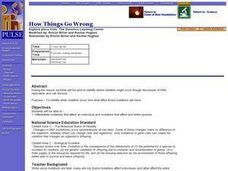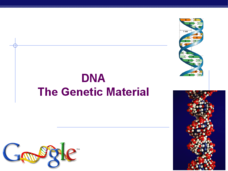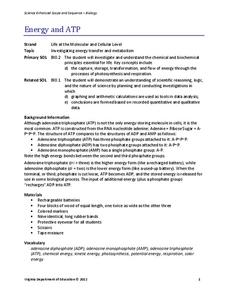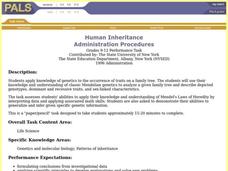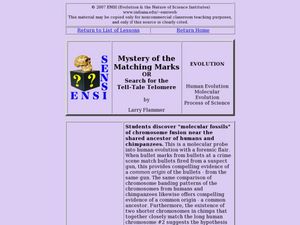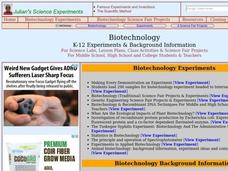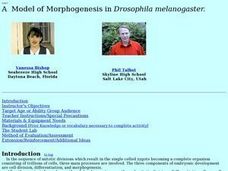Serendip
From Gene to Protein - Transcription and Translation
Learners identify the different steps involved in DNA transcription. In this genetics lesson, pupils complete a worksheet and model the translation process with a paper chain activity. They watch a video on sickle cell anemia and explain...
Curated OER
How Things Go Wrong
Students identify where mutations might occur and examine what effect those mutations will have through class discussion of DNA replication and cell division. Students then differentiate between mutations that affect individuals and...
Curated OER
DNA: The Genetic Material
The various experiments and processes that were completed in the 20th century to further our understanding of DNA are summarized here. There are wonderful slides to popularize the scientists who dedicated their professional life to...
Virginia Department of Education
Energy and ATP
Take charge of your biology class by using this exciting analogy to relate the ATP process with batteries. Pupils use batteries and rubber bands to simulate the phosphate bonds between molecules in the body. They measure the distance in...
Curated OER
Human Inheritance
Students analyze genetic characteristics in a given family tree through the F2 generation. Students apply prior knowledge from Gregor Mendel's study with pea plants and his Laws of Heredity to answer questions.
Curated OER
The Case of Regulation in Cells
After your biologists have learned about transcription, translation, and gene regulation, they work in a small group to create a poster of a system that serves as an analogy of the gene regulation process. They share their creations with...
Serendip
Mitosis and Meiosis Card Sort
Cells divide by one of two processes, either mitosis or meiosis. Scholars sort cards into two sets, one representing each type of cell division. Then, they sequence the cards demonstrating an understanding of the movement of chromosomes.
National Center for Case Study Teaching in Science
Identical Twins, Identical Fates?
Can different personal experiences affect our genes? Find out in an intriguing case study about one twin who is diagnosed with mental illness and her identical twin who fears she may suffer the same fate. Designed for college-level...
Serendip
UV, Mutations, and DNA Repair
How effective are cells at repairing UV damage? An inquiry-based instructional activity has learners experiment with organism by exposing them to various levels of UV light and then examining their DNA after a period of time. Pupils test...
Virginia Department of Education
The Ratio of Surface Area to Volume
Demonstrate the ratio of surface area to volume in your high school class by using phenolphthalein, gelatin, and an onion. Intrigue the class by leading a discussion on osmosis and diffusion, then making "scientific jello." Participants...
Virginia Department of Education
Genetic Variation and Mutations
Young scientists demonstrate their creativity while completing several activities, to assess genetic variations and mutations. Instructors provide a list of options and scientists choose to write a comic strip, create a book, construct a...
Curated OER
Mystery of the Matching Marks
Learners view a Power Point and complete activities related to genetic evidence of human evolution. In this molecular evolution lesson, students view and discuss a provide presentation. They search for the "tell-tale telomere" and...
Curated OER
Biotechnology
Students explore biotechnology through various activities. For this biology lesson, students analyze its pros and cons. They study and read informative articles about biotechnology.
Curated OER
Protoplast Production (Plant Cells Without Walls)
Students explore the spherical protoplasts of plants. Students observe that plant cells have a plasma membrane in addition to the cell wall. Students plasma membranes, solutes and organelles.
Curated OER
How Genes Work Lesson Plan
Students define the key terms that are the structure and function of DNA. In this genetics lesson students complete a lab activity in which they construct a model DNA structure.
Curated OER
"Who Done It?" Analysis of Molecular Fingerprints Left At the Scene of the Crime
High schoolers examine different types of DNA fragments. They record and analyze their results. They determine who is the criminal in the story.
Curated OER
How do things flow in and out of a cell?
Students revise thier partner's essay. They also write the second draft of their essay for homework. Students use the Protein Explorer web site to visualize molecules, ATP, DNA, proteins and lipid bilayer. They are able to see all the...
National Center for Case Study Teaching in Science
Bad Fish, Bad Bird
In an advanced biology lesson, learners see a PowerPoint about biologist Dr. Westwood, a two-time victim of poisoning. Designed to be used with clickers in the classroom, you could modify the lesson by creating a worksheet from the...
Curated OER
Strawberry Smoothies
Biologists extract the DNA from a strawberry. After completing the procedure, learners write answers to a few questions on the lab sheet provided. This is ideal lab practice during a DNA unit in your general biology course.
Curated OER
Regulating Gene Expression
In this genes worksheet, students review the system that controls gene expression and the enzymes required for regulating genetic expression. This worksheet has 6 fill in the blank and 7 short answer questions.
Curated OER
A Model of Morphogenesis in Drosophila Melanogaster
Students investigate the following scientific terms and ideas: rates of diffusion, the role of morphogens in the development of larva, the chemical dynamics of a cell, and the significance of embryo polarity during development.
Curated OER
Blood Business
Students identify the different kinds of blood. In this biology lesson, students investigate the antigens, agglutinins and Rh factor using their own blood. They use Punnett squares to predict blood type of offspring.
Curated OER
Using VNTR Analysis to Identify Guilt at a Crime Scene
Students collect DNA from cheek cells. They compare and contrast the processes of DNA replication and PCR. They discuss how this information can be used to determine guilt at crime scenes.
Curated OER
Transcription, Translation, and the Genetics of Microbes
Students construct various virus models using Fruit loops and Alphabits to represent nucleotides and molecules. They constructs capsomeres using shoes as the capsomeres and discuss various viruses.



